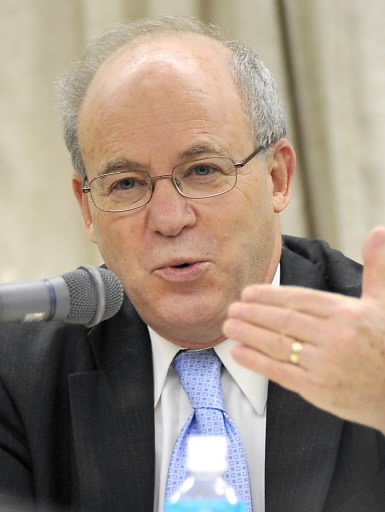Interview with John Isaacs, executive director of Center for Arms Control and Non-Proliferation
Dec. 19, 2009
by Toshiko Bajo, Staff Writer
John Isaacs, 64, executive director of the Center for Arms Control and Non-Proliferation, a private think tank in Washington, D.C., visited Hiroshima and spoke at a meeting organized by the Japan-America Society of Hiroshima and the U.S. Consulate General Osaka-Kobe on December 15. The Chugoku Shimbun sat down with Mr. Isaacs and below is a summary of his comments on U.S. nuclear policy and global nuclear issues:
The United States has entered an era of change. It can be said that President Obama's speech in Prague has been the most significant development since the start of the nuclear age. We now have a chance to work toward nuclear disarmament.
I would like to acknowledge the current efforts of the Obama administration, including the effort to advance negotiations for nuclear disarmament with Russia. As the ratification of the Comprehensive Test Ban Treaty (CTBT) requires several Senate Republicans to vote in favor of the treaty, I think it will be difficult to realize ratification before the Nuclear Non-proliferation Treaty (NPT) Review Conference next May.
Meanwhile, it seems the Senate will approve the new nuclear disarmament treaty with Russia. I hope this approval will generate momentum and lead to the ratification of the CTBT.
Regarding the NPT Review Conference next year, I think it necessary to establish a framework for dealing with nations that do not abide by its rules, in order to carry out tougher inspections and promote the scrupulous management of nuclear materials to prevent nuclear proliferation. The international community must, with patience, continue consultations on the issue of North Korea, among other matters.
These tasks cannot be accomplished by the United States alone. I hope the Japanese government will take an active role in that regard.
In connection with these problems, I have learned that some senior officials in the Japanese government opposed the retirement of U.S. Tomahawk cruise missiles [submarine-borne tactical nuclear weapons]. However, Tomahawk missiles have not been deployed at the front since 1992 and are kept in storage. The argument that weapons held in storage for 17 years would strengthen the "nuclear umbrella" for Japan does not make sense. Such moves by the A-bombed nation will hinder efforts for nuclear disarmament.
I think the nuclear umbrella will continue to play a certain role until the time nuclear weapons are totally eliminated. If Asian nations, in the meantime, strengthen their economic ties, this will serve as security to prevent nuclear war. The need for nuclear weapons will lessen.
(Originally published on December 17, 2009)
John Isaacs, 64, executive director of the Center for Arms Control and Non-Proliferation, a private think tank in Washington, D.C., visited Hiroshima and spoke at a meeting organized by the Japan-America Society of Hiroshima and the U.S. Consulate General Osaka-Kobe on December 15. The Chugoku Shimbun sat down with Mr. Isaacs and below is a summary of his comments on U.S. nuclear policy and global nuclear issues:
The United States has entered an era of change. It can be said that President Obama's speech in Prague has been the most significant development since the start of the nuclear age. We now have a chance to work toward nuclear disarmament.
I would like to acknowledge the current efforts of the Obama administration, including the effort to advance negotiations for nuclear disarmament with Russia. As the ratification of the Comprehensive Test Ban Treaty (CTBT) requires several Senate Republicans to vote in favor of the treaty, I think it will be difficult to realize ratification before the Nuclear Non-proliferation Treaty (NPT) Review Conference next May.
Meanwhile, it seems the Senate will approve the new nuclear disarmament treaty with Russia. I hope this approval will generate momentum and lead to the ratification of the CTBT.
Regarding the NPT Review Conference next year, I think it necessary to establish a framework for dealing with nations that do not abide by its rules, in order to carry out tougher inspections and promote the scrupulous management of nuclear materials to prevent nuclear proliferation. The international community must, with patience, continue consultations on the issue of North Korea, among other matters.
These tasks cannot be accomplished by the United States alone. I hope the Japanese government will take an active role in that regard.
In connection with these problems, I have learned that some senior officials in the Japanese government opposed the retirement of U.S. Tomahawk cruise missiles [submarine-borne tactical nuclear weapons]. However, Tomahawk missiles have not been deployed at the front since 1992 and are kept in storage. The argument that weapons held in storage for 17 years would strengthen the "nuclear umbrella" for Japan does not make sense. Such moves by the A-bombed nation will hinder efforts for nuclear disarmament.
I think the nuclear umbrella will continue to play a certain role until the time nuclear weapons are totally eliminated. If Asian nations, in the meantime, strengthen their economic ties, this will serve as security to prevent nuclear war. The need for nuclear weapons will lessen.
(Originally published on December 17, 2009)








